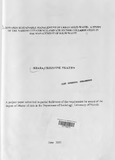| dc.description.abstract | This project paper explores the crisis of solid waste disposal in the city of Nairobi, with the aim
of finding out the status of Nairobi City Council's waste disposal services, the strategies city
residents have adopted to cope with the crisis as well as factors that influence disposal practices.
The study also aims to understand the nature of the city council-private sector collaboration,
determining the prospects that this holds for the sustainable management of solid waste and the
implications of the current approaches on the relationship between the city residents and the
council. The study therefore, seeks to answer four key questions: How adequate are the city
council waste disposal services and what strategies have the residents adopted to cope with the
crisis? What factors influence waste management practices? What is the form and nature of the
Nairobi City Council-private sector collaboration and what prospects does this collaboration hold
for the sustainable management of solid waste? and finally, what are the likely implications of
the current solid waste management approaches on the relationship between the residents and the
local authority.
The report is based on field surveys carried out in Ngumba and BuruBuru Estates in Nairobi,
three private waste management companies and the Nairobi City Council. It utilises both
qualitative and quantitative data collected using a combination of structured and unstructured
questionnaires as well as direct observational methods for the household surveys and the key
informant technique for the Private Waste management companies and the Nairobi City Council.
,
I
The study established that due to shortage of finances, financial mismanagement and
administrative incompetence; the Nairobi City Council has failed to offer service to the middleincome
estates in Nairobi, thus precipitating the current crisis. This has diminished public
confidence in the council and resulted in very poor relations between the council and the
residents. Consequently, residents are less willing to pay council rates and levies, further
inhibiting collection of revenue, and perpetuating the cycle of financial scarcity and poor service.
Inevitably, the city council has conceded its inability to deliver efficient services and sought to
encourage private sector participation. Currently, the role of the city council is that of sector
regulator while the private companies operate independently.
To cope with the crisis most residents have adopted the services of private waste management
companies. Choice of disposal method however, is mainly determined by the need for expedient
service and cost of services and low-income households therefore, tend to be less adaptable to
the use of private sector services, opting instead for alternative methods such as burning and
dumping in garbage pits and heaps. Optimal performance by the private companies, however, is
limited by numerous intra-sector problems and their service to households is associated with
delivery problems.
The study concludes that the private sector holds certain promise for the improved management
of solid waste in Nairobi. However, it can not effectively replace the city council, nor can it
solely resolve the crisis. Inevitably, a tri-sector approach, including the private sector, the city
council and community-based organisations is imperative for sustainable management of solid
waste in Nairobi to be attained. | en |

